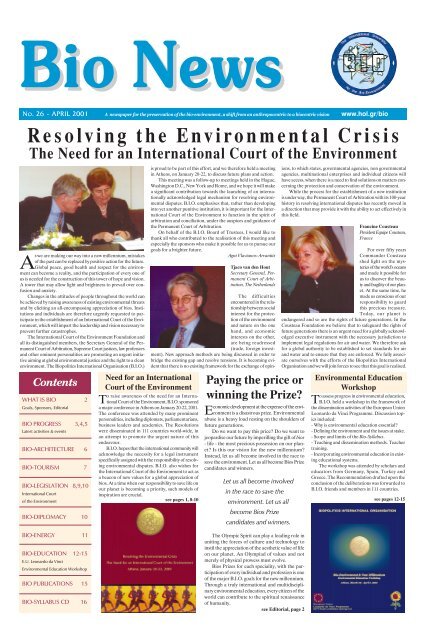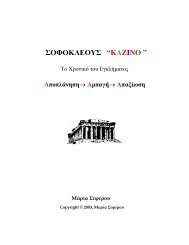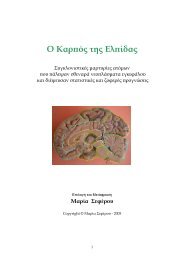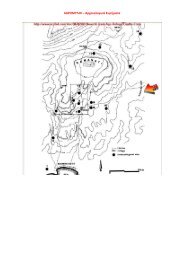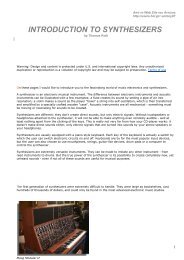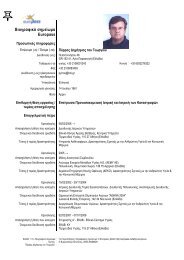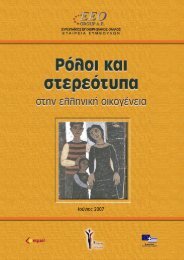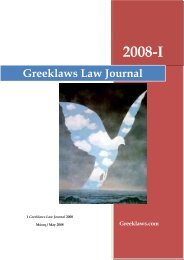BioNews 26 - pdf - Hol.gr
BioNews 26 - pdf - Hol.gr
BioNews 26 - pdf - Hol.gr
Create successful ePaper yourself
Turn your PDF publications into a flip-book with our unique Google optimized e-Paper software.
Bio News<br />
NO. <strong>26</strong> - APRIL 2001 A newspaper for the preservation of the bio-environment, a shift from an anthropocentric to a biocentric vision www.hol.<strong>gr</strong>/bio<br />
Resolving the Environmental Crisis<br />
The Need for an International Court of the Environment<br />
A<br />
s we are making our way into a new millennium, mistakes<br />
of the past can be replaced by positive action for the future.<br />
Global peace, good health and respect for the environment<br />
can become a reality, and the participation of every one of<br />
us is needed for the construction of this tower of hope and vision.<br />
A tower that may allow light and brightness to prevail over confusion<br />
and anxiety.<br />
Changes in the attitudes of people throughout the world can<br />
be achieved by raising awareness of existing environmental threats<br />
and by eliciting an all-encompassing appreciation of bios. Institutions<br />
and individuals are therefore urgently requested to participate<br />
in the establishment of an International Court of the Environment,<br />
which will impart the leadership and vision necessary to<br />
prevent further catastrophes.<br />
The International Court of the Environment Foundation and<br />
all its distinguished members, the Secretary General of the Permanent<br />
Court of Arbitration, Supreme Court justices, law professors<br />
and other eminent personalities are promoting an urgent initiative<br />
aiming at global environmental justice and the right to a clean<br />
environment. The Biopolitics International Organisation (B.I.O.)<br />
Contents<br />
WHAT IS ÂÉÏ 2<br />
Goals, Sponsors, Editorial<br />
BIO PROGRESS 3,4,5<br />
Latest activities & events<br />
ÂIO-ARCHITECTURE 6<br />
BIO-TOURISM 7<br />
ÂIO-LEGISLATION 8,9,10<br />
International Court<br />
of the Environment<br />
BIO-DIPLOMACY 10<br />
BIO-ENERGY 11<br />
BIO-EDUCATION 12-15<br />
E.U. Leonardo da Vinci<br />
Environmental Education Workshop<br />
BIO PUBLICATIONS 15<br />
BIO-SYLLABUS CD 16<br />
Need for an International<br />
Court of the Environment<br />
o raise awareness of the need for an Interna-<br />
Ttional Court of the Environment, B.I.O. sponsored<br />
a major conference in Athens on January 20-22, 2001.<br />
The conference was attended by many prominent<br />
personalities, including diplomats, parliamentarians,<br />
business leaders and academics. The Resolutions<br />
were disseminated in 111 countries world-wide, in<br />
an attempt to promote the urgent nature of this<br />
endeavour.<br />
B.I.O. hopes that the international community will<br />
acknowledge the necessity for a legal instrument<br />
specifically assigned with the responsibility of resolving<br />
environmental disputes. B.I.O. also wishes for<br />
the International Court of the Environment to act as<br />
a beacon of new values for a global appreciation of<br />
bios. At a time when our responsibility to save life on<br />
our planet is becoming a priority, such models of<br />
inspiration are crucial.<br />
see pages 1, 8-10<br />
is proud to be part of this effort, and we therefore held a meeting<br />
in Athens, on January 20-22, to discuss future plans and action.<br />
This meeting was a follow-up to meetings held in the Hague,<br />
Washington D.C., New York and Rome, and we hope it will make<br />
a significant contribution towards the launching of an internationally<br />
acknowledged legal mechanism for resolving environmental<br />
disputes. B.I.O. emphasises that, rather than developing<br />
into yet another punitive institution, it is important for the International<br />
Court of the Environment to function in the spirit of<br />
arbitration and conciliation, under the auspices and guidance of<br />
the Permanent Court of Arbitration.<br />
On behalf of the B.I.O. Board of Trustees, I would like to<br />
thank all who contributed to the realisation of this meeting and<br />
especially the sponsors who make it possible for us to pursue our<br />
goals for a brighter future.<br />
Agni Vlavianos-Arvanitis<br />
Ôjaco van den Hout<br />
Secretary General, Permanent<br />
Court of Arbitration,<br />
The Netherlands<br />
The difficulties<br />
encountered in the relationship<br />
between social<br />
interest for the protection<br />
of the environment<br />
and nature on the one<br />
hand, and economic<br />
interests on the other,<br />
are being readressed<br />
(trade, foreign investment).<br />
New approach methods are being discussed in order to<br />
bridge the existing gap and resolve tensions. It is becoming evident<br />
that there is no existing framework for the exchange of opin-<br />
Paying the price or<br />
winning the Prize?<br />
conomic development at the expense of the envi-<br />
Eronment is a disastrous prize. Environmental<br />
abuse is a heavy load resting on the shoulders of<br />
future generations.<br />
Do we want to pay this price? Do we want to<br />
jeopardise our future by imperilling the gift of bios<br />
- life - the most precious possession on our planet?<br />
Is this our vision for the new millennium?<br />
Instead, let us all become involved in the race to<br />
save the environment. Let us all become Bios Prize<br />
candidates and winners.<br />
Let us all become involved<br />
in the race to save the<br />
environment. Let us all<br />
become Bios Prize<br />
candidates and winners.<br />
The Olympic Spirit can play a leading role in<br />
uniting the forces of culture and technology to<br />
instil the appreciation of the aesthetic value of life<br />
on our planet. An Olympiad of values and not<br />
merely of physical prowess must evolve.<br />
Bios Prizes for each speciality, with the participation<br />
of every individual and profession is one<br />
of the major B.I.O. goals for the new millennium.<br />
Through a truly international and multidisciplinary<br />
environmental education, every citizen of the<br />
world can contribute to the spiritual renaissance<br />
of humanity.<br />
see Editorial, page 2<br />
ions, to which states, governmental agencies, non governmental<br />
agencies, multinational enterprises and individual citizens will<br />
have access, when there is a need to find solutions on matters concerning<br />
the protection and conservation of the environment.<br />
While the process for the establishment of a new institution<br />
is under way, the Permanent Court of Arbitration with its 100-year<br />
history in resolving international disputes has recently moved in<br />
a direction that may provide it with the ability to act effectively in<br />
this field.<br />
Francine Cousteau<br />
President Equipe Cousteau,<br />
France<br />
For over fifty years<br />
Commander Cousteau<br />
shed light on the mysteries<br />
of the world's oceans<br />
and made it possible for<br />
us to discover the beauty<br />
and fragility of our planet.<br />
At the same time, he<br />
made us conscious of our<br />
responsibility to guard<br />
this precious treasure.<br />
Today, our planet is<br />
endangered and so are the rights of future generations. In the<br />
Cousteau Foundation we believe that to safeguard the rights of<br />
future generations there is an urgent need for a globally acknowledged<br />
executive instrument with the necessary jurisdiction to<br />
implement legal regulations for air and water. We therefore ask<br />
for a global authority to be established to set standards for air<br />
and water and to ensure that they are enforced. We fully associate<br />
ourselves with the efforts of the Biopolitics International<br />
Organisation and we will join forces to see that this goal is realised.<br />
Environmental Education<br />
Workshop<br />
o assess pro<strong>gr</strong>ess in environmental education,<br />
TB.I.O. held a workshop in the framework of<br />
the dissemination activities of the European Union<br />
Leonardo da Vinci Pro<strong>gr</strong>amme. Discussion topics<br />
included:<br />
- Why is environmental education essential?<br />
- Defining the environment and the issues at stake.<br />
- Scope and limits of the Bio-Syllabus.<br />
- Teaching and dissemination methods. Teacher<br />
training.<br />
- Incorporating environmental education in existing<br />
educational systems.<br />
The workshop was attended by scholars and<br />
educators from Germany, Spain, Turkey and<br />
Greece. The Recommendation drafted upon the<br />
conclusion of the deliberations was forwarded to<br />
B.I.O. friends and members in 111 countries.<br />
see pages 12-15
page 8/Bio News BIO-LEGISLATION APRIL 2001<br />
INTERNATIONAL COURT<br />
Resolving the Environmental Crisis<br />
The Need for an International Court<br />
of the Environment<br />
Zappeion Hall, Athens<br />
Monday, January 22, 2001<br />
Conference Pro<strong>gr</strong>amme<br />
International Court of the Environment - Need and Structure<br />
Chairs: Tjaco van den Hout, Dr. Agni Vlavianos-Arvanitis<br />
Ethical framework for the protection of the bio-environment.<br />
Kitty P. Kyriacopoulos<br />
Honorary Chairman, Silver and Baryte Ores Mining Co., Greece<br />
The need for the International Court of the Environment.<br />
Judge Amedeo Postiglione<br />
Director, International Court of the Environment Foundation, Italy<br />
International Court of the Environment. Yes, but in which form?<br />
Professor Giovanni Conso<br />
President Emeritus, Constitutional Court, Italy<br />
Environmental aspects of the Charter of the International Criminal Court<br />
Dr. Ivano Iai<br />
Constitutional Court, Italy<br />
Business and Finance<br />
Chairs: Professor Udo Simonis, George Kremlis<br />
Contribution of an industry to environmental protection.<br />
Anthony Gortzis<br />
President, World Federation of Advertisers and Director of Corporate<br />
and Media Relations, Unilever, Greece<br />
Financing and the bio-environment.<br />
Constantine Kanonis<br />
President, Hellenic-Russian Chamber of Commerce, Greece<br />
Environmental responsibilities of business. International co-operation.<br />
Panayotis Koutsikos<br />
President, ERGO SA, Greece<br />
International Proposals<br />
Chairs: Professor Alfred Rest, John Sarmas<br />
War in Yugoslavia - Environmental Impact on South-East Europe<br />
John Hartland<br />
Counsellor and Special Advisor to the Secretary General of the Parliamentary<br />
Assembly, Council of Europe<br />
Protecting the Environment - A challenge on three levels<br />
Maggi Mikaelsson<br />
Member of Parliament, Sweden<br />
Our efforts to install a Global Environmental Organisation within the United<br />
Nations system.<br />
Professor Udo Simonis<br />
Science Centre Berlin, Germany<br />
Democratic procedures as a value system in environmental protection.<br />
Dr. Harilaos Harakas<br />
Legal Counsel, Federation of Greek Industries, Greece<br />
Access to Environmental Justice. Methods of Implementation<br />
Chairs: Anthony Gortzis, Dr. Ivano Iai<br />
The European Commission view on access to environmental justice.<br />
George Kremlis<br />
Head, Judicial and Legislative Affairs European Commission DG XI<br />
Peaceful settlement of transnational environmental conflicts. Why not by an<br />
International Court of the Environment?<br />
Professor Alfred Rest<br />
Senior Academic Counsellor, University of Koln, Germany<br />
International Court of the Environment. Structure and content recommendations.<br />
John Sarmas<br />
Member of the National Court of Audits, Greece<br />
Global Governance<br />
Chairs: Dr. Agni Vlavianos-Arvanitis<br />
Responsibilities and penalties. The necessity for a world executive instrument<br />
for air and water.<br />
Francine Cousteau<br />
President, Equipe Cousteau, France<br />
Resolving environmental disputes. From negotiation to adjudication<br />
Tjaco van den Hout<br />
Secretary General, Permanent Court of Arbitration, The Netherlands<br />
The protection of bios. An urgent priority in international policy<br />
Dr. Agni Vlavianos-Arvanitis<br />
President and Founder, Biopolitics International Organisation, Greece<br />
Kitty Kyriacopoulos<br />
Honorary Chairman,<br />
Silver and Baryte Ores<br />
Mining Co., Greece<br />
The protection of<br />
the environment concerns<br />
every human<br />
being on this planet,<br />
and unless we realise<br />
this fact, I fear that we<br />
will not be able to protect<br />
our planet for<br />
future generations.<br />
Education is the only<br />
way to achieve this<br />
awareness. This is why<br />
the teaching of the Biopolitics philosophy is so important and<br />
should start even as early as kindergarten. However, this is a longterm<br />
mission. Meanwhile, there is much to be done in other fields.<br />
Obligations should be imposed on all enterprises - not only industries<br />
- to respect the environment.<br />
I believe ethics should became the number one objective of<br />
all governments throughout the world. However, the big responsibility<br />
lies with those countries which have achieved their economic<br />
advantages not only at the expense of their own environment<br />
but, often, at the expense of less developed regions of our world.<br />
The creation of an International Court of the Environment is<br />
imperative. Action should be taken immediately; time will not<br />
wait.<br />
International Court of the Environment<br />
Need and Structure<br />
Judge Amedeo<br />
Postiglione<br />
Director, International<br />
Court of the Environment<br />
Foundation,<br />
Italy<br />
The International<br />
Court of the Environment<br />
would ensure<br />
a universal economic<br />
development based on<br />
the fair exploitation of<br />
resources, by complying<br />
with the legal standards<br />
and the obligations<br />
as foreseen by<br />
international law. Only with such an innovative legal instrument<br />
will it be possible to remove the case of environmental damage<br />
having international relevance from the fields laying outside jurisdiction,<br />
since it is society that experiences the environmental damage.<br />
Today, it seems urgent and necessary to establish - without<br />
resorting to bureaucratic controlling and antidemocratic bodies<br />
- an International High Authority for the Environment, a real<br />
Agency with powers and means, and an International Court of the<br />
Environment - i.e. a real jurisdiction open to individuals and<br />
NGOs, though equipped with the appropriate filtering mechanisms<br />
which could deal with the most serious cases on international<br />
liability initiated by individuals, associations or States. The Earth<br />
has a limited size and few resources, which are all interdependent.<br />
Therefore, environmental justice on a global level has a welldetermined<br />
ethical basis because the challenge is very actual.<br />
Though it is not a simple task, it is urgent to identify some conducts<br />
that are to be blamed, prevented and sanctioned from the<br />
moral, social and legal point of view.<br />
Professor Giovanni<br />
Conso<br />
President Emeritus,<br />
Constitutional Court,<br />
Italy<br />
The B.I.O. Conference<br />
for the International<br />
Court of the<br />
Environment, which<br />
was held in Athens -<br />
cradle of ethical and<br />
aesthetic values - will<br />
reinforce the enactment<br />
of such an exec-<br />
From Rhetoric to Reality<br />
utive instrument. There are two ways in which we can proceed. Either<br />
to create an independent court to try environmental crimes, or to<br />
use the existing international institutions that will be provided<br />
with the necessary legislative framework. The first solution is obviously<br />
preferable, but the institution of an independent instrument<br />
may be delayed considerably, as demonstrated by the fiftyyear<br />
process for global recognition of the Charter of the International<br />
Criminal Court, which is only just being completed. It would,<br />
therefore, be more efficient to incorporate environmental crimes<br />
in the jurisdiction of the International Criminal Court with the necessary<br />
legislative adjustments and modifications. This does not only<br />
constitute a political, scientific or legal need, but predominantly<br />
an ethical and aesthetic need.<br />
Professor Alfred Rest<br />
Senior Academic<br />
Counsellor, University<br />
of Koln, Germany<br />
An International<br />
Environmental Court<br />
is indispensable.<br />
National courts are<br />
still most ineffective<br />
and, at the international<br />
level, courts do<br />
not have a comprehensive<br />
competence to<br />
protect the environment<br />
sufficiently, or<br />
cannot guarantee the<br />
rights of NGOs or individuals, because of lack of legal access.<br />
Nevertheless, international courts are a prerequisite for the development<br />
of international environmental law and can also play a very<br />
important complementary role to support the work of the PCA,<br />
which for the time being, could be the right forum for the development<br />
of an International Court of the Environment.<br />
By its recent Draft Optional Rules for Arbitration of Disputes<br />
Relating to Natural Resources and/or the Environment,<br />
the PCA offers new innovative instruments for an effective control<br />
of the application of national and international environmental<br />
law, as well as for the participation of private parties and other nonstate-actors<br />
in the dispute resolution process. It thereby takes<br />
into account the increasing importance of NGOs, environmental<br />
interest <strong>gr</strong>oups and individuals in the field of environmental protection.<br />
Dr. Ivano Iai<br />
Constitutional Court,<br />
Italy<br />
The Charter of the<br />
International Criminal<br />
Court, signed in<br />
1998 in Rome, contains<br />
certain interesting<br />
aspects relating to<br />
the environment.<br />
These aspects are crucial<br />
elements that can<br />
be inte<strong>gr</strong>ated under<br />
the jurisdiction of a<br />
future instrument for<br />
universal justice. The<br />
Charter treats crimes against the natural environment, such as<br />
the use of poisons or toxic weapons and gases in the case of war<br />
as war crimes. The creation of an International Court of the Environment<br />
will not constitute an obstacle for the jurisdiction of the<br />
International Criminal Court, since its role in environmental<br />
issues is limited to environmental damage caused by war.<br />
John Sarmas<br />
Member of the National Court of Audits, Greece<br />
Extensive effort, global mobilisation, increased expectations<br />
by the international community, but despite milestones such as the<br />
Rio Declaration and Agenda 21, reality is <strong>gr</strong>im. The international<br />
movement for the protection of the environment has failed. As<br />
evidenced at the recent meeting on global climate change in the<br />
Hague, intensification of the phenomena is obvious to all of us,<br />
but the international community is unable to get its act together.<br />
What is going on?<br />
The International Court for the Environment can be nothing<br />
but the endline to a process of global evolution. The global community<br />
proceeds with <strong>gr</strong>eat hesitation to the legal settlement of<br />
international disputes and only when the circumstances are
APRIL 2001 BIO-LEGISLATION page 9/Bio News<br />
OF THE ENVIRONMENT<br />
favourable. A new<br />
process has to get<br />
underway, set on a<br />
new basis. The root<br />
of the problem has to<br />
be addressed. Protection<br />
of bios and the<br />
environment must be<br />
modestly incorporated,<br />
following the lessons<br />
learnt by successful<br />
initiatives. Possibly,<br />
instead of the<br />
UN, the first step<br />
should be taken by the<br />
Council of Europe,<br />
under the auspices of<br />
which operates the most successful international institution, the<br />
European Court for Human Rights.<br />
Access to Environmental Justice<br />
Methods of Implementation<br />
George Kremlis<br />
Head, Juidicial and<br />
Legislative Affairs,<br />
European Commission<br />
DG XI<br />
Access to environmental<br />
justice and<br />
law is a matter of considerable<br />
importance,<br />
especially during the<br />
implementation of<br />
environmental policy<br />
and, therefore, protection<br />
of the environment.<br />
It is evident<br />
that with no enforcement<br />
mechanism, environmental law is not complete. On the<br />
European Union level there is no environmental court. The duties<br />
of the European Court of Justice (ECJ) include environmental matters<br />
and, therefore, it acts to a certain extent as an environmental<br />
court. The ECJ is based on articles of EU law. The environmental<br />
cases presented so far at the ECJ involve a <strong>gr</strong>eat variety<br />
of legal issues. Such cases can be extremely complex and technical<br />
and may require technical support, which is usually provided<br />
by officials from DG XI.<br />
The preparation of the 6th Environmental Action Pro<strong>gr</strong>amme<br />
could be an opportunity to address some of the aforementioned<br />
issues in a co-decision frame where the European Parliament is<br />
expected to request more public participation and access to justice.<br />
In this evolving context, the idea of creating environmental<br />
courts becomes very attractive and challenging in the sense that<br />
it may facilitate access to justice in general, make it more effective<br />
and foster the improved application of the available instruments<br />
at international, EC and national level. Best practices could<br />
be developed in this direction.<br />
Professor Udo Simonis<br />
Science Centre Berlin,<br />
Germany<br />
International Proposals<br />
Global environmental<br />
policy could<br />
gain strength if the<br />
management of the<br />
United Nations Environment<br />
Pro<strong>gr</strong>amme<br />
(UNEP) or of the UN<br />
Commission on Sustainable<br />
Development<br />
(CSD) were made<br />
more efficient. However,<br />
such a minimalistic<br />
strategy of efficiency improvement is no panacea: it can only<br />
be an element, not the core of future global environmental policy.<br />
Therefore, instead of merely calling for improved efficiency<br />
and co-ordination, proposals have been made to establish a world<br />
Environment and Development Organisation (WEDO) as a new<br />
specialised agency of the United Nations. At the very least, such<br />
an organisation should inte<strong>gr</strong>ate UNEP, the CSD and the relevant<br />
Convention Secretariats (climate, biodiversity, desertification<br />
conventions); close co-operation with the Bretton Woods institution<br />
- the World Bank, the International Monetary Fund (IMF), the<br />
World Trade Organisation (WTO) - and the existing UN specialised<br />
agencies would need to be ensured.<br />
Also, ideas have been presented on the decision-making procedures,<br />
the participation of non-governmental organisations<br />
(NGOs), and on the financing of such a World Environment and<br />
Development Organisation.<br />
Maggi Mikaelsson<br />
Council of Europe<br />
Parliamentary Assembly,<br />
Sweden<br />
Today, we live<br />
in a world where we<br />
can no longer deny<br />
the existence of huge<br />
environmental problems<br />
that impact our<br />
lives. Depleted uranium<br />
used in the<br />
NATO bombings in<br />
South-eastern<br />
Europe, cyanide pollution<br />
of the Tisza<br />
river in Romania, "mad-cow" disease threatening food production<br />
in many countries in Europe are just some examples of what<br />
has been occurring during the last years.<br />
Is this necessary? Could these environmental disasters have<br />
been prevented? What can we do to create a better standard of<br />
living for all people, so that bios - life on this earth - can be secured<br />
for future generations?<br />
I would like to focus on three levels where urgent action is needed.<br />
These are: the individual, the private, and the political level.<br />
As individuals we have an ostensible right to bios, to life. But, as<br />
an individual, one does not only have rights, one also has duties.<br />
If we wish to change the situation, we have the responsibility not<br />
only to talk or to wish, but also to act. In this context, a legal mechanism<br />
to solve environmental disputes on an individual level, a national<br />
level and between countries is urgent. Weather there should be<br />
a new International Court of the Environment or whether existing<br />
legal instruments could be adjusted to also handle environmental<br />
issues, is yet to be apparent. I hope, anyway, that the discussions<br />
that are taking place under the leadership of the Biopolitics International<br />
Organisation will put the question forward.<br />
John Hartland<br />
Counsellor and Special<br />
Advisor to the Secretary<br />
General of the Parliamentary<br />
Assembly,<br />
Council of Europe<br />
The Council of<br />
Europe is co-operating<br />
with the Biopolitics<br />
International Organisation<br />
from the early<br />
1980s. This co-operation<br />
will continue also<br />
this year with the common<br />
preparation of a<br />
conference about<br />
lifestyles in the new millennium. This conference will focus on<br />
many of the subjects that will be discussed here today. The Council<br />
of Europe is making its decisions along with the Council of<br />
External Affairs Ministers, on the basis of the proposals made by<br />
each Parliamentary Committee and the Minister of each country.<br />
The Council of Europe will organise a meeting for the effects on<br />
the environment of the war in Yugoslavia. The Council has shown<br />
a <strong>gr</strong>eat sensitivity on this issue and, if the majority of member<br />
states a<strong>gr</strong>ee, there will be a proposal in co-operation with the<br />
Security Council about what can be done in situations like those<br />
that we experienced in the recent war.<br />
RESOLUTIONS<br />
Acknowledging that there exists a global environmental<br />
crisis that threatens all the major ecosystems and life -<br />
bios - on our planet;<br />
Acknowledging also the <strong>gr</strong>owing public demand for an<br />
urgent solution to this crisis and the need to espouse new<br />
ethics;<br />
Recognising the fundamental right to a healthy environment<br />
in conformity with human dignity and the need of<br />
each individual to have the appropriate legal access;<br />
Recognising also that all States and all people shall co-operate<br />
in eradicating poverty and in protecting the global<br />
environment for the benefit of present and future generations;<br />
Emphasising that the international community has an<br />
obligation, as the guardians of global natural resources,<br />
to conserve, protect and restore these resources and to preserve<br />
all other species from further pollution, contamination<br />
and extinction;<br />
Emphasising also that an International Court of the Environment<br />
could also contribute to the development and<br />
promotion of international environmental law;<br />
Emphasising further that such a court is intended to be<br />
complementary to international, regional and national<br />
judicial systems including the relevant compliance and<br />
enforcement instruments;<br />
Reaffirming the Millennium Declaration adopted by the<br />
United Nations General Assembly on September 18, 2000,<br />
in particular the relevant articles pertaining to the respect<br />
for nature and protecting our common environment; and<br />
Recalling the spirit of the resolutions adopted at the conference<br />
at George Washington University on April 15-<br />
17, 1999, by the Biopolitics International Organisation<br />
on June 7, 2000, and at the International Court of the<br />
Environment Foundation Conference in Rome, on November<br />
10, 2000<br />
it is resolved that:<br />
1. There is an urgency to recommend to governments,<br />
parliaments, international organisations and non-state<br />
actors to consider, without further delay, the establishment<br />
of an International Court of the Environment with<br />
mandatory jurisdiction and broad legal access.<br />
2. There is a fundamental human right to a healthy environment<br />
that can be protected through such a court.<br />
3. Pending the establishment of such a Court considers that<br />
the Permanent Court of Arbitration (PCA) is the appropriate<br />
forum to resolve environmental disputes.<br />
4. The recent efforts made by the PCA to develop a specific<br />
set of rules of procedure to resolve disputes pertaining<br />
to natural resources and the protection of the environment<br />
are welcomed.<br />
5. Governments and parliaments are invited to be guided<br />
by the spirit of this resolution in their forthcoming<br />
meetings and conferences on these and related issues.
page 10/Bio News BIO-DIPLOMACY APRIL 2001<br />
INTERNATIONAL COURT OF THE ENVIRONMENT<br />
P<br />
Business and Finance<br />
Constantine Kanonis<br />
President, Hellenic-Russian<br />
Chamber of Commerce, Greece<br />
Would you invest for profit<br />
in the Chernobyl, or<br />
Kozlodoui, nuclear plants?<br />
Would you buy shares in a<br />
company that manufactures<br />
products from depleted uranium?<br />
Would you lend money<br />
to a project that has been sued<br />
for polluting the Danube, or<br />
a good part of the sea and coastline?<br />
Nobody in their right mind would do any of the above, irrespective<br />
of their environmental sensitivities. Therefore, environmental<br />
issues should be taken into consideration when participating<br />
in or financing any project. The environment has been<br />
deteriorating and development is endangered. Our only hope is<br />
that our "bio-awareness" has increased.<br />
Bio-awareness can save the environment and provide development.<br />
Financing is undertaken by banks and international<br />
organisations. If we compare the projects financed that have burdened<br />
substantially the environment to those projects that are<br />
environmentally friendly the conclusion is not encouraging. Today's<br />
global society is neither as civilised as we imagine nor as healthy<br />
as we think.<br />
Economy and ecology have the same prefix: eco. It comes<br />
from the Greek word for "home." Therefore, economy deals with<br />
the laws (nomy) of our home and ecology deals with the logic that<br />
should govern it. Our home, today, is our Earth. I would like to<br />
conclude by stating the obvious: There is no economy and ecology<br />
without life - bios - and there is no life without economy and<br />
ecology.<br />
Bio-diplomacy - defence for life<br />
resent threats to bios are international problems. The<br />
required solutions entail the development plans of action<br />
for peace and international understanding. International<br />
co-operation may lead to a new era for the diplomatic world; the<br />
era of bio-diplomacy. Nations will no longer be at war with each<br />
other but, with environmental destruction and abuse. Foreign<br />
policy may thus shift from a fragmented, competitive framework<br />
to a vision of unity and interdependence.<br />
Bio-diplomacy recognises that cultural differentiation constitutes<br />
the wealth of the body of humanity. Humanity is part of<br />
the overall body of bios, where DNA, the genetic code for every<br />
living organism, is the link connecting all forms of life. Trees, the<br />
source of oxygen on our planet, can be considered the "lungs" of<br />
the body of bios. Damage to the lungs is not an isolated event but<br />
results in the whole body suffering. These unifying concepts are<br />
promoted as the primary consideration of bio-diplomacy which<br />
is involved in enhancing international co-operation in environmental<br />
issues and actively supports efforts to maintain biological and cultural<br />
diversity. At the same time, bio-diplomacy seeks to improve<br />
human relations and attain the goal of world peace by replacing<br />
current diplomatic attitudes with a complete international and<br />
intercultural perspective. Diplomats of all ranks and nations should<br />
be able to appreciate the <strong>gr</strong>eat importance of this task and make<br />
the best possible use of all the levels of power at their disposal.<br />
The pursuit of bio-diplomacy in a co-ordinated fashion, at the<br />
international, national, regional, and local levels, will undoubtedly<br />
provide for increased co-operation among people across all borders<br />
separating them. Especially where issues of "transborder pollution"<br />
are concerned, the need for internationally a<strong>gr</strong>eed upon<br />
preventative policy is crucial. Diplomacy can encourage international<br />
co-operation in environmental protection to enable countries<br />
not only to control, but also to promote the eradication of<br />
environmental deterioration, through international co-operation<br />
and the sharing of experiences and know-how. The role of major<br />
international environmental fora (Rio, Kyoto etc.) can be crucial,<br />
and make a significant contribution to the reversal of global<br />
climate change and the implementation of Agenda 21.<br />
To encourage international co-operation the world needs to<br />
stop investing in war and start investing in the preservation of the<br />
bio-environment. Competition for ways to destroy, should become<br />
co-operation for ways to save. Without interfering with vested<br />
interests, the <strong>gr</strong>eatest challenge for the 21st century should become<br />
the development of new ways of channelling current defence protocols<br />
so as to adopt the principle of defence for bios as the primary<br />
national and international priority. Existing defence equipment<br />
can be amended and used for reforestation, water resource<br />
clean-up, soil erosion recovery, protection of the ozone layer and<br />
the de-contamination of areas affected by nuclear radiation.<br />
A. Vlavianos-Arvanitis. The Bios Theory, 1985.<br />
Anthony Gortzis<br />
President, World Federation<br />
of Advertisers and Director of<br />
Corporate and Media Relations,<br />
Unilever, Greece<br />
In the following decades,<br />
industry will be judged according<br />
to the services it provides<br />
in order to protect the environment.<br />
The truth is that a<br />
lot has been done, and there<br />
is optimism and an effort to achieve a cleaner environment. The<br />
recognition of the importance of the environment is not simply<br />
the result of increased public awareness of such issues. It stems<br />
from a firm conviction that we have a responsibility to contribute<br />
to a better future. This responsibility is a fact. Our own existence<br />
depends on it. If the environment is our world then we ought to<br />
make it better. Industry, as a social unit with structure, organisation<br />
and social responsibility, can play an active role in this effort.<br />
When an industry systematically controls its polluting substances<br />
and monitors waste generation then it can improve profits.<br />
Dr. Harilaos Harakas<br />
Legal Counsel, Federation of Greek Industries, Greece<br />
In our time, an era of transition to a new age when the multifaceted<br />
and complex procedure of globalisation is accelerating at<br />
an extreme rate as a result of the rapid pro<strong>gr</strong>ess made by technology<br />
- in particular, information technology - we can observe irrational<br />
developments in all systems and imbalances between the economy,<br />
politics, culture and values. This rapid and unstable course of<br />
globalisation leads to nightmarish risks for the whole biosystem<br />
and for life in general. Therefore, the idea of an International<br />
Court of the Environment inevitably leads to the suggestion that<br />
the value system of the judicial procedure must be selected and<br />
Panagiotis Koutsikos<br />
President, ERGO S.A., Greece<br />
Âio-Diplomacy<br />
The conference events were attended by the<br />
following Ambassadors and diplomats:<br />
The Ambassadors of Armenia Armen Petrossian,<br />
Great Britain David Madden, Canada David Hutton,<br />
Colombia Manuel Jose Bonett, FYROM Ljunco<br />
Arsouski, Israel Ran Curiel, Italy Agostino Mathis,<br />
Hungary Istvan Pataki, Luxembourg Fernand Kartheiser,<br />
The Netherlands Paul Brouwer, Poland Wojtek<br />
Lamentowicz, Slovakia Milan Dubcek, Slovenia Bornd<br />
Mahnic, Thailand Precha Pitisant, the Apostolic<br />
Nuncio Paul Fouad Tabet, the Diplomatic Representative<br />
of the Palestine Abdullah Abdullah, the<br />
Charge d'Affaires of the Embassy of Brazil Paolo<br />
Roberto Franca, the Scientific Attache of the Chinese<br />
Embassy Mr. Zhang, the Minister Councillor of<br />
the Embassy of Georgia Akoki Lomidze, the Charge<br />
d'Affaires of the Hungarian Embassy Maria Szekelyi,<br />
the Councillor of the Hungarian Embassy Karolyi<br />
Kiss, the Minister Councillor of the Embassy of Indonesia<br />
Bistok Damanik, the Minister Councillor of the Italian<br />
Embassy Mr. Sampoli, the Charge d'Affaires of the<br />
Embassy of the Netherlands Vervloed Jïhannes, the<br />
Minister of the Embassy of Sweden Sven Malmberg<br />
and the Charges d'Affaires of the Embassies of Ukraine<br />
Yevgen Berebyinis and Yugoslavia Goran Alexic.<br />
The presence of so many diplomats at this Biopolitics<br />
conference is an example of bio-diplomacy in<br />
action. Environmental threats do not discriminate<br />
along national boundaries, and global co-operation<br />
in environmental protection is an urgent priority. The<br />
conference resolutions will be promoted in the countries<br />
that were represented, and we hope that, in this<br />
way, the establishment of an International Court of the<br />
Environment will be accelerated and further environmental<br />
destruction will be prevented.<br />
applied appropriately, in order<br />
to enhance older and new values<br />
in the most judicious and democratic<br />
manner. B.I.O. can<br />
encourage the genuinely and<br />
globally represented international<br />
civil society to enter a serious<br />
and intensive participatory<br />
procedure, and that it can bring<br />
about and maintain an international<br />
sense of vigilance.<br />
We cannot allow further<br />
squandering of natural resources.<br />
Governments and people must<br />
realise that the problem of atmospheric,<br />
<strong>gr</strong>ound and water pollution<br />
affects us all. A lot of<br />
money must be spent in order<br />
to remediate and, most importantly,<br />
to prevent environmental<br />
accidents and damage. On the other hand, however, it must become<br />
clear that the cost of protecting the environment should not be considered<br />
solely the responsibility of a certain social sector - such as<br />
the business sector - but should be equally distributed among<br />
social <strong>gr</strong>oups, according to their capacity to bear the financial<br />
burden. It is essential to understand that without a clean and protected<br />
environment, no human endeavour or action will be able<br />
to have long-term potential. There is no place on this planet that<br />
can constitute a safe haven for anyone in the event of serious environmental<br />
de<strong>gr</strong>adation. Pollution and environmental abuse will<br />
sooner or later affect the doers. Nature will take revenge.


